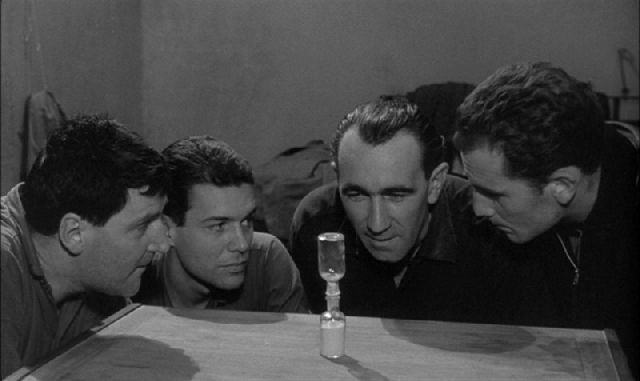Le trou (1960) 

Director: Robert Bresson
Cast: André Bervil, Jean Keraudy, Michel Constantin
Synopsis: In prison four long-sentence inmates planning an elaborate escape cautiously induct a new inmate to join in their scheme which leads to distrust and uncertainty.
The backstory to Jacques Becker’s prison escape movie Le Trou is something quite remarkable. Jose Giovanni, upon whose novel the film is based, was imprisoned in 1948 for his part in a racketeering venture in which three people were murdered — although Giovanni himself was responsible for no deaths. His death sentence was commuted to 20 years hard labour, during which he became involved in the prison escape which is dramatized in Le Trou. The film opens with one of the prisoners, Roland Darbant) with his head under the bonnet of a CV. Darbant turns to the character, and tells the audience that his friend Jacques Becker has made a film about the prison escape in which he was involved. Darbant is played by Jean Keraudy — who was one of Giovanni’s real-life accomplices in the breakout…
Le Trou resembles an anatomy of a prison break; eschewing any extraneous incidents or sub-plots unrelated to the execution of the escape, Becker spends a lot of time examining the mechanics. Sometimes filming in real time, he shows us the prisoners hacking away at the concrete floor of their cell without once cutting away. It should be boring, but there’s a strange fascination to their endeavours, and an admiration for their ingenuity — or at least the ingenuity of Keraudy’s character — and perseverance.
At the beginning of the film, young Claude Gaspard (Marc Michel) is transferred to a cell shared by four other prisoners: Roland, Manu (Philippe Leroy), Monsignor (Raymond Meunier) and Geo (Michel Constantin). Their wariness of their new cellmate is eventually explained once they decide to take him into their confidence and reveal that they are planning a prison break. Facing a sentence in excess of ten years for the attempted murder of his wife, Gaspard readily agrees to be part of their plan.
The bulk of the film focuses on the meticulous methods employed by the prisoners as they dig a tunnel under the guidance of three-time escapee Roland. There are a few minor obstacles, but things go remarkably smoothly until the day of their planned escape, when Gaspard is unexpectedly summoned to the warden’s office…
There’s a definite pro-working class slant to Giovanni’s story. Apart from Gaspard, the other prisoners are all working class. We’re never told why they are in prison, but all four, despite possessing diverse characters, are portrayed as reliable and honest (in their own way), while Gaspard, a young man who squandered his wealth and cheated on his wealthy wife, fails to measure up to his cellmate’s qualities.
The story itself is expertly crafted, with a tight plot, filmed in a harsh, naturalistic style in the actual prison from which the escape took place, and using mostly non-professional actors (apart from Michel who, as Giovanni explained, had to be a professional actor because he was playing a role within a role). Despite the clinical manner in which the planning and execution of the escape is portrayed, the story is never less than wholly absorbing, and the final dilemma faced by Gaspard is of the type that leaves every viewer asking just how they would react if ever they found themselves in his position.
(Reviewed 19th October 2012)
httpv://www.youtube.com/watch?v=6T1h6qbb_Zo
